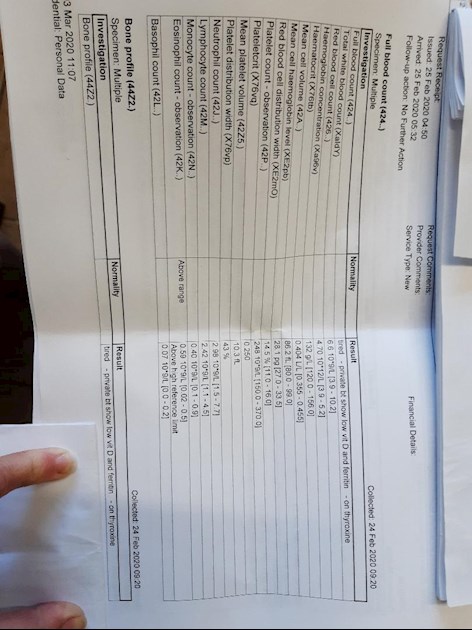I am currently on 100mcg of thyroxine, but have been struggling over the last year with tiredness and dizziness, dry skin, hair loss. I did a private test last year (I will attach more pics in the comments), this identified low vit D and folate and also low ferritin. I took this to my GP who advised me that my thyroid and ferritin were ok but agreed it wouldn't do any harm to add some vit supplements. I supplemented with Vit D and B vits and this did make me feel a bit better, (alleviated the dizziness and some of the tiredness). I seemed relatively stable for a few months through the summer last year but then had a bad reaction to TEVA thyroxine in september after my usual brand was changed (terrible headaches and heart palpitations). The chemist transferred me back to my usual brand but it seemed to knock me back a bit. Over the winter I progressively got more ill and picked up another virus that resulted in a course of steroids.
I ran another set of bloods in Feb this year and again it identified low Vit D and ferritin. I took these results to my GP who agreed that my ferritin was low and undertook a full blood count, results also attached in post below. My thyroid hormones were tested at the same time and came back within range (although I note that my T4 looked quite low).
My full blood count came back normal but my GP ran iron studies as he was felt that the low ferritin could be causing my symptoms.
My Iron studies results are below Lab ranges in ():
Serum C reactive protein <4mg (0-6)
Serum Ferritin 13ng/ml (10-291)
Iron level 13.1umol (10-30.4)
Transferritin Level 2.57gL (2.5-3.8)
Iron saturation 22% (16-50)
I have noticed that with an increase in Vit D levels my dizziness does improve, however, I realise that I will probably need to supplement all year round to ensure sufficient levels. I have been using the better you vit d and k2 spray, although keeping this at 75ug doesn't appear to be enough for me.
1. Advice on Vit D dosage would be appreciated.
2. Also looking for advice on improving my ferritin levels. My GP was willing to discuss iron tablets but also wondering if I can increase this myself.
3. Any further advice on my thyroid bloods, my GP has said a flat out no on increasing thyroxine, but I do feel there may be scope for an increase?
Thanks very much
(I will add rest of blood results in comments)
